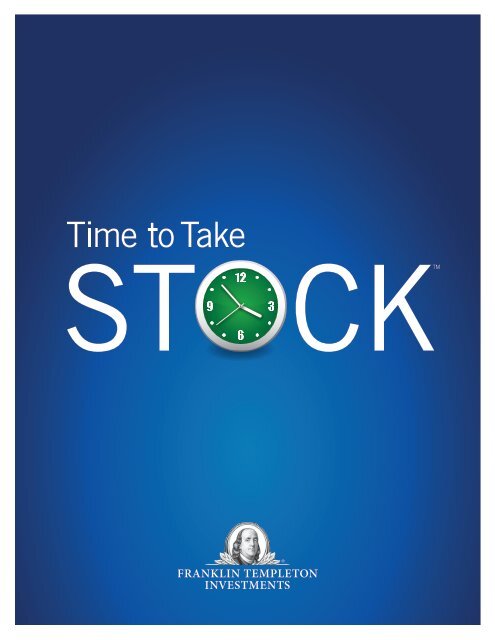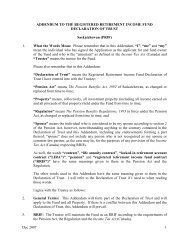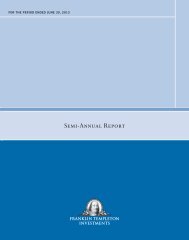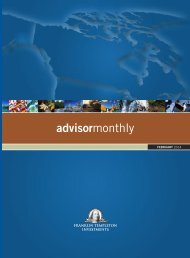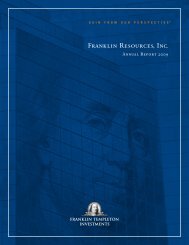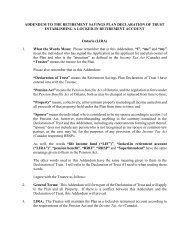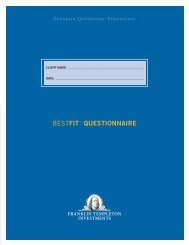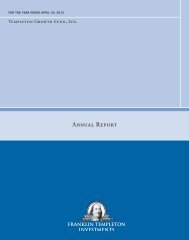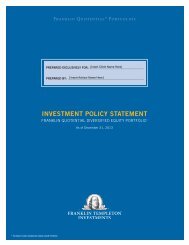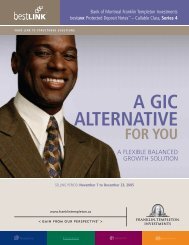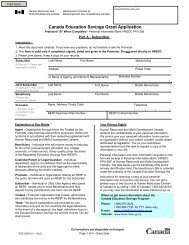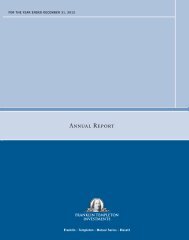Download the Time to Take Stock Brochure - Franklin Templeton ...
Download the Time to Take Stock Brochure - Franklin Templeton ...
Download the Time to Take Stock Brochure - Franklin Templeton ...
- No tags were found...
Create successful ePaper yourself
Turn your PDF publications into a flip-book with our unique Google optimized e-Paper software.
“Bull markets are born on pessimism,grow on skepticism, mature on optimismand die on euphoria.”—Sir John Temple<strong>to</strong>n,Temple<strong>to</strong>n Funds Founder and Former Chairman
The pullback of <strong>the</strong> s<strong>to</strong>ck market in 2008 left a lasting impression on manyinves<strong>to</strong>rs. The result: a hangover of anxiety about investing in equities andtrillions of dollars sitting in low-yielding savings instruments. 1It’s time <strong>to</strong> take s<strong>to</strong>ck of <strong>the</strong> current situation facing inves<strong>to</strong>rs, <strong>the</strong> humanbehaviour that helped land us here and how inves<strong>to</strong>rs can rebuild <strong>the</strong>irportfolios <strong>to</strong> reach <strong>the</strong>ir long-term goals.1] The Inves<strong>to</strong>r’s DilemmaSee why inves<strong>to</strong>rs <strong>to</strong>day face a difficult dilemma—at current yields, <strong>the</strong>ir investments inmany traditional fixed income vehicles are essentially at a standstill, while <strong>the</strong>ir long-terminvestment goals continue <strong>to</strong> require capital growth.2] How We Got HereLearn about <strong>the</strong> instinctive behaviours that impact how we make decisions. Having a greaterunderstanding of <strong>the</strong>se behaviours may help you make better decisions when it comes <strong>to</strong>investing.3] What Most Inves<strong>to</strong>rs Are MissingWhile it may feel like <strong>the</strong> economy is still struggling, <strong>the</strong>re are many positive developmentsthat may surprise you.4]Taking <strong>the</strong> Next StepReview simple strategies for getting back in<strong>to</strong> <strong>the</strong> s<strong>to</strong>ck market, at your own pace, with yourfinancial advisor and <strong>Franklin</strong> Temple<strong>to</strong>n mutual funds.1. Money Market Accounts and CDs from <strong>the</strong> U.S.; Money Market Funds and GICs from Canada. As of 9/30/2013.franklintemple<strong>to</strong>n.ca <strong>Time</strong> <strong>to</strong> <strong>Take</strong> S<strong>to</strong>ck 1
2]How We Got HereWe’re Only HumanThe field of behavioural finance examines <strong>the</strong> psychological and behavioural variables that cancome in <strong>to</strong> play with investing. As humans, our decisions can be influenced by emotions, biases andassumptions, especially when it comes <strong>to</strong> money. Recognizing you may be subject <strong>to</strong> <strong>the</strong>se fac<strong>to</strong>rsmay help you make better investment decisions.Availability BiasOur thinking is greatly influenced by what is personally mostrelevant, recent or dramatic. And little has been more dramaticthan <strong>the</strong> unprecedented events of <strong>the</strong> 2008 financial crisisthat continues <strong>to</strong> be at <strong>the</strong> forefront of inves<strong>to</strong>rs’ minds.LINGERING PESSIMISM GUIDES PEOPLE’S MONEYEvidence that post-crisis pessimism is starting <strong>to</strong> fade is only nowbecoming apparent as shown below by <strong>the</strong> significant positiveinflows from equity funds so far in 2013.U.S. Equity Fund Net Flows 32008 2009 2010 2011 2012-$2 Billion-$23 Billion$161 Billion2013“The inves<strong>to</strong>r’s chiefproblem—and evenhis worst enemy—islikely <strong>to</strong> be himself.”—Benjamin Graham-$128 Billion-$153 Billion-$229 Billion3. Source: Investment Company Institute. As of 12/31/2013.franklintemple<strong>to</strong>n.ca <strong>Time</strong> <strong>to</strong> <strong>Take</strong> S<strong>to</strong>ck 3
The Disconnect Between Perception and Reality<strong>Franklin</strong> Temple<strong>to</strong>n surveyed one thousand Americans in 2010, 2011, 2012 and 2013 and asked<strong>the</strong>m how <strong>the</strong> s<strong>to</strong>ck market finished at <strong>the</strong> end of <strong>the</strong> previous year. Roughly half of respondentsfor each survey answered that <strong>the</strong> s<strong>to</strong>ck market was down or flat.Perception—What U.S. Inves<strong>to</strong>rs Believe HappenedPercentage ofSurvey RespondentsWho Said <strong>the</strong> S<strong>to</strong>ckMarket Was Downor Flat 466%200949%201070%201131%2012Reality—How <strong>the</strong> Market PerformedInves<strong>to</strong>rs have continued <strong>to</strong> take money out of equity funds, in part due <strong>to</strong> <strong>the</strong> belief that <strong>the</strong>s<strong>to</strong>ck market has performed poorly in recent years. But has it? As shown in <strong>the</strong> chart below, whileU.S. s<strong>to</strong>cks experienced a severe downturn in 2008, <strong>the</strong> next three years were positive, indicatinga misperception about <strong>the</strong> s<strong>to</strong>ck market’s performance.S&P 500 Annual Returns 526.5%15.1%16.0%2.1%20082009201020112012-37.0%4. Sources: The 2010 <strong>Franklin</strong> Temple<strong>to</strong>n Global Inves<strong>to</strong>r Sentiment Survey, designed in partnership with ORC International, included 1,010 telephone responses from participants age 18 and older in <strong>the</strong>U.S. from 3/25/10 <strong>to</strong> 3/28/10. The 2011 <strong>Franklin</strong> Temple<strong>to</strong>n Global Inves<strong>to</strong>r Sentiment Survey, designed in partnership with ORC International, included 1,049 online responses from participants age 18 andolder in <strong>the</strong> U.S. from 1/6/11 <strong>to</strong> 1/7/11. The 2012 <strong>Franklin</strong> Temple<strong>to</strong>n Global Inves<strong>to</strong>r Sentiment Survey, designed in partnership with Duke University professor Dan Ariely and Qualtrics, included 1,142 onlineresponses from participants age 18 and older in <strong>the</strong> U.S. from 1/30/12 <strong>to</strong> 2/13/12. The 2013 <strong>Franklin</strong> Temple<strong>to</strong>n Global Inves<strong>to</strong>r Sentiment Survey designed in partnership with ORC International. Included 501telephone respondents from participants aged 25 years and older in <strong>the</strong> U.S. with investable assets of $25,000 or greater from 1/14/13 <strong>to</strong> 1/25/13.5. Source: © 2013 Morningstar. All rights reserved. The information contained herein: (1) is proprietary <strong>to</strong> Morningstar and/or its content providers; (2) may not be copied or distributed; and (3) is not warranted<strong>to</strong> be accurate, complete or timely. Nei<strong>the</strong>r Morningstar nor its content providers are responsible for any damages or losses arising from any use of this information. Indexes are unmanaged and one cannotinvest directly in an index.4 <strong>Time</strong> <strong>to</strong> <strong>Take</strong> S<strong>to</strong>ck franklintemple<strong>to</strong>n.ca
Loss AversionStudies have shown that <strong>the</strong> pain of a loss is much stronger than <strong>the</strong> reward felt from a gain.In fact, <strong>the</strong> desire <strong>to</strong> avoid market losses has caused many inves<strong>to</strong>rs <strong>to</strong> move <strong>the</strong>ir money out ofs<strong>to</strong>cks and in<strong>to</strong> low-yielding fixed income vehicles, trading potential market losses for potentialnegative real returns once <strong>the</strong> impact of inflation is fac<strong>to</strong>red in.PERCEIVED SAFETY MAY COME AT A COSTAs inves<strong>to</strong>rs, we may make financial decisions <strong>to</strong> avoid <strong>the</strong> pain of loss. Inves<strong>to</strong>rs’ reluctance<strong>to</strong> get back in<strong>to</strong> <strong>the</strong> s<strong>to</strong>ck market is evidence of this behaviour.However, this perceived safety may come at a cost. The chart below shows <strong>the</strong> average moneymarket fund yield over <strong>the</strong> past 10 years along with <strong>the</strong> inflation-adjusted yield. Although someinves<strong>to</strong>rs may consider money market funds a “more secure” investment option while <strong>the</strong>y wai<strong>to</strong>ut s<strong>to</strong>ck market volatility, <strong>the</strong>y may not be aware of <strong>the</strong> potential erosion of <strong>the</strong>ir purchasingpower.Money Market Funds’ Average Yield Before and After Inflation 610-Year Period Ended December 31, 20134%2%0%0.38%-0.81%-2%Inflation-Adjusted-4%1/2004 6/2005 11/2006 4/2008 9/2009 2/2011 7/2012 12/2013The long wait. If you held your money in cash, it would take over181 years for your money <strong>to</strong> double 76. Sources: Money Market Funds – Morningstar Research Inc. as of December 31, 2013. Canadian Money Market Fund Yield of 0.38% is based on <strong>the</strong> Morningstar Money Market CAD Peer Group Average whichcontained 189 funds. Inflation – Bank of Canada, as of December 31, 2013. Based on Canadian Consumer Price Index year-over-year change.7. Average <strong>Time</strong> <strong>to</strong> Double Investment is calculated using <strong>the</strong> following formula: (Natural Log (2) / Natural Log (1+Yield)), Formula for Natural Log is LN. Amount earned on a 1-Year $10,000 investmentassumes <strong>the</strong> investment is made on <strong>the</strong> as of date below. As of December 31, 2013.franklintemple<strong>to</strong>n.ca <strong>Time</strong> <strong>to</strong> <strong>Take</strong> S<strong>to</strong>ck 5
HerdingAs social animals, it’s not easy <strong>to</strong> stand behind an opinion that differs from <strong>the</strong> majority. We areprogrammed <strong>to</strong> follow <strong>the</strong> crowd and tend <strong>to</strong> assume <strong>the</strong> consensus view <strong>to</strong> be correct. Unfortunately,when it comes <strong>to</strong> investing, herd mentality may significantly impact long-term results.The Problem of Going with <strong>the</strong> FlowIn <strong>the</strong> chart below, <strong>the</strong> orange line represents performance of <strong>the</strong> S&P 500 since December 31,1990 and <strong>the</strong> green shading represents flows by U.S. inves<strong>to</strong>rs in<strong>to</strong> equity funds. When <strong>the</strong> S&P 500performed well, <strong>the</strong>re was an influx of money <strong>to</strong> equity funds (buying high)—and when <strong>the</strong> marketpulled back, inves<strong>to</strong>rs withdrew <strong>the</strong>ir money from equities (selling low) and rushed in<strong>to</strong> bond funds.U.S. Inves<strong>to</strong>rs Following <strong>the</strong> Herd His<strong>to</strong>rically Bought High and Sold LowS&P 500 Performance vs. Equity and Bond Fund Net New Flows 8S&P 500Equity & BondFund Flows$105,000S&P 500 PerformanceEquity Fund FlowsBond Fund FlowsBUYING HIGH$450 Billion$350 Billion$75,000$250 Billion$45,000$150 Billion$15,000$10,000Investment$50 Billion-$50 Billion-$15,000-$150 Billion-$45,000SELLING LOW12/1990 1994 1998 2002 2006 2010 12/2013-$250 Billion8. Sources: S&P 500: © 2013 Morningstar Research Inc.; Equity and Bond Fund Flows: Investment Company Institute. Flows are represented by monthly 12-month net new cash flows. Indexes are unmanagedand one cannot invest directly in an index. As at December 31, 2013.6 <strong>Time</strong> <strong>to</strong> <strong>Take</strong> S<strong>to</strong>ck franklintemple<strong>to</strong>n.ca
4]Taking <strong>the</strong> Next StepVolatility has kept many inves<strong>to</strong>rs on<strong>the</strong> sidelines in low-yielding investments.While “playing it safe” may make sensefor inves<strong>to</strong>rs with short time horizons,this approach leaves long-terminves<strong>to</strong>rs at risk of not achieving <strong>the</strong>irinvestment goals.Armed with <strong>the</strong> knowledge that we makedecisions based on emotion, and that<strong>the</strong>re are many positive signs that point<strong>to</strong> a potentially bright future for equities,now may be a good time <strong>to</strong> talk <strong>to</strong> yourfinancial advisor about stepping back in<strong>to</strong><strong>the</strong> s<strong>to</strong>ck market.Strategies <strong>to</strong> Re-Enter <strong>the</strong>S<strong>to</strong>ck MarketStepEarn Income. Work with your financialadvisor <strong>to</strong> move a portion of your moneyout of fixed income investments andin<strong>to</strong> a balanced fund (a fund that investsin both s<strong>to</strong>cks and bonds) with a focuson income.10 <strong>Time</strong> <strong>to</strong> <strong>Take</strong> S<strong>to</strong>ck franklintemple<strong>to</strong>n.ca
WALKBuild a Position. Move more confidentlyand develop a plan with your financialadvisor <strong>to</strong> systematically move your moneyoff <strong>the</strong> sidelines and back in<strong>to</strong> equity funds.By building an equity position using periodicinvestments, you may be able <strong>to</strong> buy moreat market dips and less at market peaks.Periodic investing plans do not assure a profitand do not protect against a loss in a decliningmarket.RUNCapitalize on Opportunity. If you’re ready<strong>to</strong> take advantage of potential opportunitiesand move back in<strong>to</strong> <strong>the</strong> s<strong>to</strong>ck marketbefore <strong>the</strong> rest of <strong>the</strong> herd, now may bean opportune time. Talk <strong>to</strong> your financialadvisor about a strategy that makes sensebased on your investment goals.No matter how you choose <strong>to</strong> get back in<strong>to</strong> <strong>the</strong>s<strong>to</strong>ck market—stepping, walking or running—<strong>Franklin</strong> Temple<strong>to</strong>n has <strong>the</strong> funds <strong>to</strong> getyou started.franklintemple<strong>to</strong>n.ca <strong>Time</strong> <strong>to</strong> <strong>Take</strong> S<strong>to</strong>ck 11
A Premier Investment Management OrganizationFor more than six decades, individuals and institutions around <strong>the</strong> world have looked <strong>to</strong><strong>Franklin</strong> Temple<strong>to</strong>n Investments 17 as a trusted partner in asset management. With an unwaveringfocus on investment excellence, we offer a unique combination of experience, global perspectiveand a consistent, disciplined approach <strong>to</strong> investing that has proven itself across market cycles.A globally diversified business 18 with:Over $875billion (USD)Assets under management65 +Years of ExperienceOffices in over 30countries around <strong>the</strong> world150 +Countries servedOur Global PresenceArgentina Australia Austria Bahamas Brazil Canada China COLOMBIA France Germany Hong Kong Hungary India ItalyJapan Luxembourg Malaysia Mexico Ne<strong>the</strong>rlands Poland Romania Russia Singapore slovakia South Africa South KoreaSpain Sweden Switzerland THAILAND Turkey United Arab Emirates United Kingdom United States URUGUAY Vietnam17. <strong>Franklin</strong> Resources, Inc. is a global investment management organization operating as <strong>Franklin</strong> Temple<strong>to</strong>n Investments. <strong>Franklin</strong> Temple<strong>to</strong>n Investments provides global and domestic investmentmanagement solutions managed by its <strong>Franklin</strong>, Temple<strong>to</strong>n, <strong>Franklin</strong> Mutual Series, Fiduciary Trust, Darby and <strong>Franklin</strong> Bissett investment teams.18. As of December 31, 2013.12 <strong>Time</strong> <strong>to</strong> <strong>Take</strong> S<strong>to</strong>ck franklintemple<strong>to</strong>n.ca
The Expertise of Many. The Strength of One.<strong>Franklin</strong> Temple<strong>to</strong>n’s distinct multi-manager structure combines <strong>the</strong> specialized expertise offour world-class investment management groups—<strong>Franklin</strong>, Temple<strong>to</strong>n, <strong>Franklin</strong> MutualSeries and <strong>Franklin</strong> Bissett. Each of our portfolio management groups operates au<strong>to</strong>nomously,relying on its own research and staying true <strong>to</strong> <strong>the</strong> unique investment disciplines that underlieits success.TEMPLETON ®<strong>Franklin</strong><strong>Franklin</strong>BISSETT ®Founded in 1947,<strong>Franklin</strong> is arecognized leaderin fixed incomeinvesting and alsobrings expertisein growth- andvalue-style equityinvesting.FRANKLIN ® Founded in 1940, Founded in 1949,Temple<strong>to</strong>n pioneeredinternationalinvesting and, in1954, launchedwhat has become<strong>the</strong> industry’s oldestglobal fund. Today,with offices inover 25 countries,Temple<strong>to</strong>n offersinves<strong>to</strong>rs a trulyglobal perspective.MUTUAL SERIES ® Founded in 1982—<strong>Franklin</strong> MutualSeries is dedicated<strong>to</strong> a unique styleof value investing,searching aggressivelyfor opportunity amongwhat it believes areundervalued s<strong>to</strong>cks,as well as arbitragesituations anddistressed securities.recognized leadersin Canadian equity,balanced and fixedincome investing,<strong>Franklin</strong> Bissett’sapproach <strong>to</strong> GARPfocuses on findingbusinesses that havegrowth supported bysustained profitability.TO LEARN MORE about <strong>Franklin</strong> Temple<strong>to</strong>n mutual funds, talk <strong>to</strong> yourfinancial advisor <strong>to</strong>day. A financial advisor can prove invaluable in helping youdefine your needs and narrowing <strong>the</strong> search for investments suitable <strong>to</strong> yourunique financial objectives.
For more than six decades, individuals and institutions around <strong>the</strong> world have looked <strong>to</strong> <strong>Franklin</strong>Temple<strong>to</strong>n Investments as a trusted partner in asset management. We leverage <strong>the</strong> expertise ofmultiple, independent portfolio teams <strong>to</strong> deliver specialized expertise across a wide range of stylesand asset classes. Our experts are on <strong>the</strong> ground in over 30 countries, spotting investment ideasand potential risks firsthand. Collectively, <strong>the</strong>y allow us <strong>to</strong> offer clients investment solutions shapedby local insight, global context, and a long-term investment horizon.<strong>Franklin</strong> Temple<strong>to</strong>n Investments Corp.5000 Yonge Street, Suite 900Toron<strong>to</strong>, ON M2N 0A7Fax: (416) 364-1163Client Services Toll-free: (800) 387-0830www.franklintemple<strong>to</strong>n.caFounding Member of The Canadian Coalition for Good GovernanceCanadian Offices: Calgary • Montreal • Toron<strong>to</strong>U.S. Offices: Ft. Lauderdale • Fort Lee • Los Angeles • Miami • New York City • Norwalk • Rancho CordovaSalt Lake City • San Mateo • Short Hills • St. Petersburg • Washing<strong>to</strong>n D.C. • Wilming<strong>to</strong>nInternational Offices: Abu Dhabi • Amsterdam • Beijing • Brussels • Buenos Aires • Cape Town • Caracas • ChennaiDubai • Dublin • Edinburgh • Frankfurt • Geneva • Hong Kong • Hyderbad • Istanbul • Johannesburg • LondonLuxembourg • Madrid • Melbourne • Mexico City • Milan • Moscow • Mumbai • Nassau • Paris • Poznan • Rio DeJaneiro • Sao Paulo • Seoul • Shanghai • Singapore • S<strong>to</strong>ckholm • Sydney • Taipei • Tokyo • Vienna • Warsaw • ZurichNYSE: BEN201401061251Commissions, trailing commissions, management fees and expenses all may be associated with mutualfund investments. Please read <strong>the</strong> prospectus before investing. Mutual funds are not guaranteed, <strong>the</strong>irvalues change frequently and past performance may not be repeated. <strong>Franklin</strong> Temple<strong>to</strong>n Fixed IncomeGroup, a business unit of <strong>Franklin</strong> Temple<strong>to</strong>n Investments Corp., combines <strong>the</strong> expertise of <strong>the</strong> <strong>Franklin</strong>Advisors, Inc., and Fiduciary Trust Company International fixed income teams. Bissett InvestmentManagement is a division of <strong>Franklin</strong> Temple<strong>to</strong>n Investments Corp.© 2014 <strong>Franklin</strong> Temple<strong>to</strong>n Investments Corp. All rights reserved. TSCA BE 12/13


